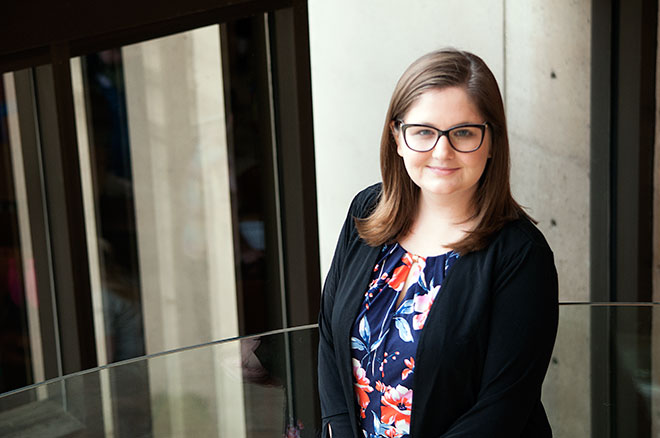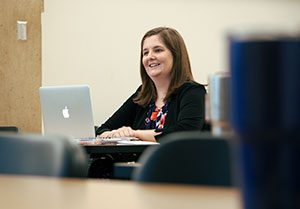
Law student with OCD manages condition with accommodations, perseverance
My friends from high school like to joke around about the new, low-key version of Emily Brown. They saw me at my worst: unmedicated, with a mind that could never sleep or quiet down.
I didn’t sleep. I barely ate; I weighed under 90 pounds. I had panic attacks daily, and I had a fever or an infection almost every week. The doctors tested me for everything under the sun. At one point, a doctor looked at me and asked if what I was experiencing was “all in my head.”
It was — in a way.
My parents pushed me to get psychiatric help. But I was reluctant. My illness was about control, and I thought it was something I should be able to handle. If it was in my head, why couldn’t I fix it? But at one point during my junior year, I sat on the floor of my bedroom. I knew things needed to change. I was tired.
I was diagnosed with obsessive-compulsive disorder (OCD) soon after that, and since then, I’ve been taking medication to help alleviate my symptoms.
When I first considered law school, I was hesitant. While I thrived in high-stress environments, I also knew that my mental illness did, too.
 I took the plunge anyway. The first year was tough. The adjustment to a new schedule, to new people was physically stressful. But I made it through.
I took the plunge anyway. The first year was tough. The adjustment to a new schedule, to new people was physically stressful. But I made it through.
I was lucky enough to make a few friends and find a place for myself in Green Hall. Director of Career & Student Counseling Services Leah Terranova told me about academic accom-modations, and for the first time in my life, I did not have to spend my finals worrying about the person sitting next to me. By getting my own room, I could control my environment and focus on what was important: the test.
In the past, I’ve been distracted by the simplest things. How close someone is next to me, where their stuff is located and how neat it is. Someone rubbing their jeans, a fly, the sound of a ticking clock. Someone shifting in their seat or moving frequently could leave me unable to focus for an entire test period. But space was the key factor in my ability to focus.
By myself, I could focus perfectly.
I watched my first criminal trial during my first summer in law school. I realized that day that I wanted to do criminal law and to be a prosecutor.
For someone with OCD, for someone with any anxiety disorder, this was a terrifying thought. Public speaking was not my strength, and I saw how much analysis and argumentation had to be done without any preparation. I wasn’t sure if I was cut out for it; I wasn’t sure if I could handle the stress of being in the courtroom all day, of being a litigator. But the stubborn person I am, I decided to try it.
I learned this summer that my mental illness did not have to hold me back in the real world. I interned at the Sedgwick County District Attorney’s Office, and I had one of the best experiences of my life. I had the chance to try my first jury trial. I stood up, spoke, and I did not puke — not once. The defendant decided to testify last minute, and the defense introduced wild evidence on the last day. I had absolutely no control, and I loved every moment of it.
Law is not an easy career choice, and with the added stress of having a mental illness, it can be an even more difficult field to work in. But that is the beauty of law. It is terrifying, overwhelming and challenging, but when you put that pen to paper for the first time at your job or when you stand in front of a judge and speak, you know exactly why the fight is worth it.
— Emily Brown is a third-year KU Law student from Overland Park.